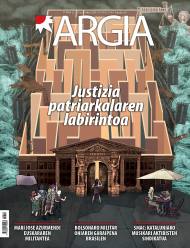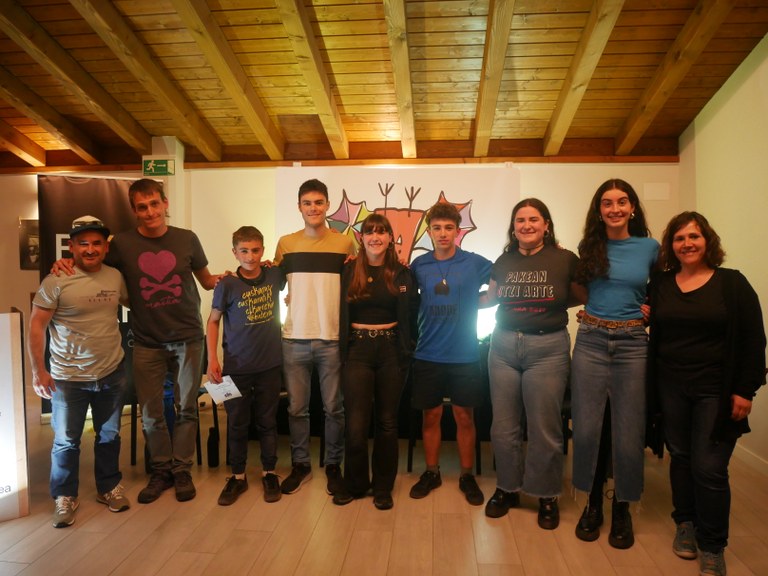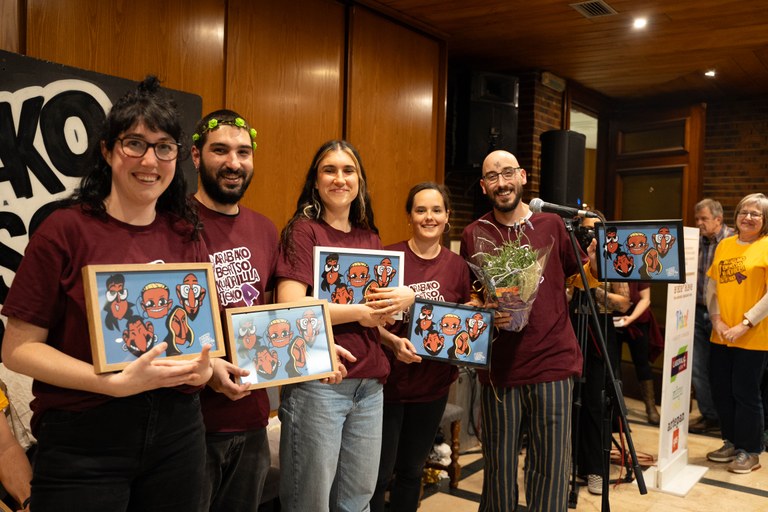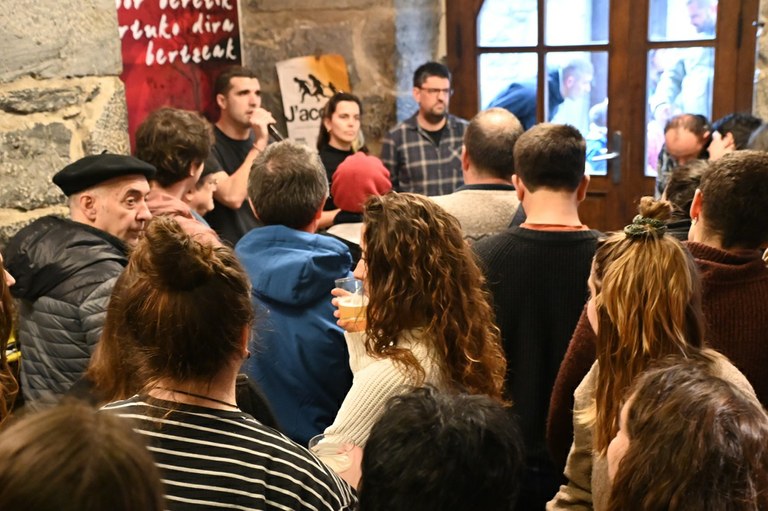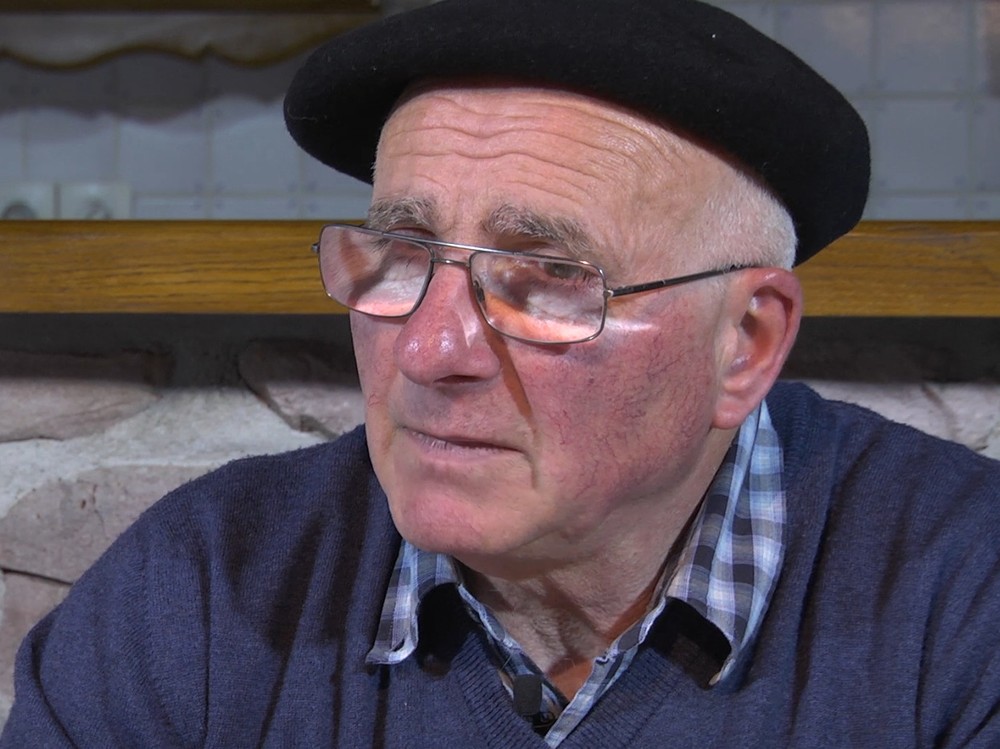"The clown has always been the voice of the voiceless"
- At the International Improviser Tour, from 9 to 14 October, we had two foreign improvisers: Tomasita Quiala (Cuba, Arroyón de Flores, 1961) is a veteran repentist, one of the best known in Cuba, who arrives for the third time in Euskal Herria. He has been blind since he was born and the one in front of him immediately guesses how to put the sting in. Araceli Argüello (Pozo del Molle, 1995) is a new generation of payers. The boat where Matea drinks has come to Euskal Herria with the help of his companions for the first time.

Did you find it weird to sing with the bertsolaris in Basque?
TOMASITA QUIAL: It was not so surprising to me, I have the third visit to the Basque Country, I was in 1988 and in 1998. Recently, Maialen Lujanbio was nothing more than a little girl, I knew that I would become a high-level bertsolari, I am glad I was not mistaken. It's nice to sing with the bertsolaris, and on this occasion, we've also had Araceli next to us. We all have one goal: Delivery and reception of love.
ARACELI ARGÜELLO: I have come to Europe for the first time. This has enriched my trajectory, before I would not have gone from my head singing with the Euskaldunes, but it has been an excellent experience. I had never sung with Tomasita, so all my dreams were accomplished at the same time. The public has surprised me, the bertsolaris have great respect.
In Argentina and Cuba, you improvise the guitar. There is a difference with Bertsolarism.
T. Quiala: The way we express ourselves is different, but it's not a problem, we love working with bertsolaris. Payers, repentists and bertsolaris are doctors, we're always learning, improvisers have to evolve in every generation, learning from each other. I always say that improvisers are soul doctors.
Payers and repentists share language, Spanish. Does that facilitate exchanges between you?
A. ARGÜELLO: What surprised me to hear from the Bertsolaris is that they have a lot of melodies in their heads, because they don't use the help of the instruments. Instead, payers are both musicians and improvisers. There is a difference with the Cubans, they sing and they have a friend who plays the guitar. In addition to language, we share the metric, the tenth, but we use the milonga melody and they use the Cuban point. It is related to its geography: Milonga is like a large Argentine pampa, which stands at the point of the tibieza of Cuba.
How did you start to improvise at the Cuban point, Tomasita?
T. Quiala: I started by chance two months before I was 22. As I was walking down the street, I heard one sudden insulting another. My poetic instinct was still asleep, but it woke up and I started to improvise right there because of the sudden, outraged. When I went through the same place the next week, the director of the Peña Campesina wanted to sing with me. 35 years later I'm here.
You're a professional improviser in Cuba, how does your day to day look like?
T. Quiala: This is my trade for 32 years. The repentist learns above all from experience: The school of repentists is a taboo. To do this, it is convenient that the repentist next to you should be your level. I say that repentism is like a treasure, but it is not worth hiding. In other words, we have to show that treasure to the world so that everyone has the opportunity to receive it. The most successful will be the improviser who comes to share his art with everyone.
Didn't you go to the repentists' school?
T. Quiala: There are now repentist schools. But I had to learn about the stage what they learn in those schools, I was going day-to-day seeing what was OK and what wasn't. The classes are important to expand the Cuban point, but I want to make one point: Repentist is not done, born. Thanks to schools, these natural talents are discovered earlier and can be cultivated from a young age to then be excellent repentionists.
Araceli, you've had a tendency to improvisation ever since you were a kid, right?
A. ARGÜELLO: In Argentina, the tradition of payers is tied to equestrian trades, my grandfather, my father and my brother were gentlemen. When I saw them, I would throw prepared verses at them, and I've always felt the desire to be payers. At five years old, we were asked what we wanted to be older and everyone wanted to be doctors and things like that. I said I was going to be a payer, my referent was Marta Suint. Little by little, I started singing and playing guitar. Because in my province there were not many payers, I'm self-taught.
Payada and Cuban point are traditions linked to the rural environment and the traditional world. Have you been to urbanization in recent years?
T. Quiala: Of course, the Cuban point has spread to the cities. However, it is true that this is a tradition that comes from the rural environment, linked to the life of the guajiro. But in both schools and theatres, it is respected, cared for and cultivated, reaching all layers of Cuban society. Now there are classes for repentists, that idea we created in Cuba, and then it has spread to other improvisations.
A. ARGÜELLO: When Payada started, it was linked to the rural environment, but it was also present in the cities. For example, Gabino Ezeiza was a Radical Party payer. The payer has always been the voice of the voiceless: In the history of Argentina gauchos have always been marginalized figures, so the payer has always been in favor of them, and that is why the cultures of gauchos and payers are very united, which has led to improvisation to the field. However, in recent years, there has been a tendency to migrate to cities, without forgetting the traditions and values of night people. Urbanization has provided better training to bring the art of payers to the highest level.
In Cuba, improvisation has its place on television.
T. Quiala: On national television there are programmes that broadcast repentism, Palmas and rods is well known, every Sunday at 7 p.m. receives a large part of the audience. Furthermore, we are now delighted in Cuba, because UNESCO has declared the Cuban Intangible World Heritage Site. Thanks to that great achievement, it has given us strength to those of us who have been working for years to revitalize improvisation and will give a push to the new generations so that they do not let this tradition die.
Improvisation is also coming into the academic world. You investigate orality, Araceli.
A. ARGÜELLO: I'm studying Language and Literature in college. However, in the university there is still no teaching of paid as a subject. In schools yes, in the province of Córdoba we have been pioneers in bringing improvisation to the classrooms, so that students see that payada is not a history of old gauchos, it is a very vivid tradition. We also have a series in Argentina, Alma Gaucha, within which they dedicate 10-15 minutes to payers. Because of this, people know the faces of payers.
Has the effort to attract young people borne fruit?
A. ARGÜELLO: We need to promote more; it is difficult for young people to do so. Argentina is very broad and it is not easy to bring together those who want to be payers. Above all, it's costing us to attract young girls. Improvisation classes continue to be taught outside the regulated system, we are working to introduce payada into regulated education.
Exchanges between improvisers from one country to another allow mutual learning. Is it common for payers and repentists to sing with other improvisers?
T. Quiala: I have been involved in many of them. In Mexico, Chile, Panama -- they grow the Tenth, in Puerto Rico they are very good. The habit of improvisation occupies much of the world, but we need to unite everyone around a single party.
A. ARGÜELLO: I've done less foreign travel than Tomasita. Argentina is very large in itself, and it is enough to travel from one place to another. This year, I have traveled El Charquito [Río de la Plata], to sing in Uruguay, a beautiful experience. Other payers have travelled more, for example, to Trovadores Week, where many meetings are organised.
Do women improvise in Cuba? Have you had to overcome the prejudices of society?
T. Quiala: When I first started, 35 years ago, re-pentist women were to retire, because they were old. But I've noticed that the girls who have started these years have become amazing quality improvisers. Two years ago, Yunet López was in the Basque Country, a reference of repentism in Cuba.
However, it was not an easy start.
T. Quiala: Bear in mind that I was a young, blind woman. In the Cuban system the question of equality had been advanced, but nevertheless, for some sudden men it was rare for me to appear there, I struggled to make my place.
Do women payers in Argentina have more difficulties than men?
A. ARGÜELLO: Look, in Argentina, if you're a woman, you have to fight more in every field. In our case, Marta Suint, Susana Repetto, Mariela Acevedo -- they've been pioneers, they're paid professionals. As many meetings are held in Cuba, many women have the opportunity to be professionals, but in Argentina there is not so much habit of making meetings. In the Basque Country, the most important thing is the arena or the plaza, and there women still have little power, it is still the environment of men. I was born into a traditional family and I struggled to open the way, because at first I went to the plaza, not to the theaters. Because I have a strong personality, I started, I made room.
Has there been any thought to move away from the improvisation of totally masculine references, themes, formats, etc. ?
A. ARGÜELLO: We need to deepen awareness, we need to awaken society. That is a universal commitment, in which the bertsolaris, the repentists and the payers have to work together.
T. Quiala: When I started, everyone was telling me to ‘attack’ or ‘defeat’ other repentists, instead of being on a stage, as if we were in the ring boxing or a galloping fight. Fortunately, there has been a development there, we too have made a great effort. We are an example, the public learns from us, and we have taught the Cuban public another way to compete. Repentism is not the imposition of one's own opinion over the other, but knowing how to give solid reasons.
SUDDENLY
On the future of the Cuban point, Tomasita Quiala:
I think that the Cuban
point Intangible
Heritage of Total Humanity has
a future in its hand.
For every child and old man to
make his or her verse
to let him or
her live in Cuba, tradition will
be our mission not to
let him or her die.
[Gross translation: The Cuban point Intangible Heritage of Humanity has the future in its hands. That every child and every old man reanime his or her verse, for it is a mission of all not to let him or her die. ]
About the future of Payada, Araceli Argüello:
We have the referents
with such a deep singing
of the world always,
for, from the front,
they bring the latent verse.
With this I assure
you that the future I
predict eternal youth with
guitar or with lute
in youth is certain.
[Gross translation: We have referents, the walkers of the world, who have always brought the bertso face to face. The future of payada is guaranteed by Youth. ]
Maiatzaren 8an hasiko da Bizkaiko Bertsolari Txapelketako sailkapen fasea. Zortzi saio bikoitz jokatuko dira maiatzeko eguenetan. Sarrerak eskuragai daude bertsosarrerak.eus atarian.
Asteburu honetan hasiko da Gaztetxeak Bertsotan egitasmo berria, Itsasun, eta zazpi kanporaketa izango ditu Euskal Herriko ondorengo hauetan: Hernanin, Mutrikun, Altsasun, Bilboko 7katun eta Gasteizen. Iragartzeko dago oraindik finala. Sariketa berezia izango da: 24 gaztez... [+]
Vagina Shadow(iko)
Group: The Mud Flowers.
The actors: Araitz Katarain, Janire Arrizabalaga and Izaro Bilbao.
Directed by: by Iraitz Lizarraga.
When: February 2nd.
In which: In the Usurbil Fire Room.



.JPG)




